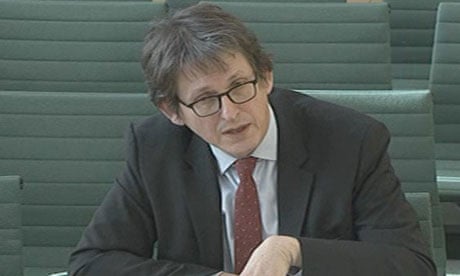The editor-in-chief of the Guardian has told MPs he and his national newspaper counterparts were seeking legal advice over whether to accept controversial Leveson proposals regarding third-party complaints and whether they should handle such complaints in the spirit of equalities legislation.
Alan Rusbridger told the Commons culture media and sport select committee on Tuesday that there remained "five clauses" of Leveson's main recommendations for the future of press regulation that editors at last Wednesday's meeting at the Delaunay restaurant in central London had only agreed to endorse subject to "being scrutinised by our lawyers".
That meeting had endorsed 40 of Leveson's 47 recommendations in principle – all of those not requiring statutory intervention – but the need to take legal advice on five of them, coupled with a failure to circulate a minute of the meeting promptly, has contributed to concerns the Delaunay deal may unravel.
Rusbridger said that some editors are "nervous about third-party" complaints, and referred to Leveson's recommendation 11, which said the new regulator should accept grievances from "a representative group affected by the alleged breach, or a third party seeking to ensure accuracy".
He added that some unnamed editors said they were "unhappy" with another phrase in Leveson's clause 38, which said the new regulator should be able to intervene in a case of allegedly discriminatory reporting in "the spirit of equalities legislation".
Rusbridger, responding to questions from Labour MP Paul Farrelly, said that a minute of the Delaunay meeting was taken on behalf of the chair, James Harding, the editor of the Times. He said it was "not a very controversial minute" but added that a copy had not yet been circulated to all participants six days after the meeting took place.
Some editors fear that the delay in sending out the minute reflects the fact there could be an attempt to row back on what was agreed at the Delaunay. It is understood that the minute was taken by Philip Webster, the former political editor of the Times, who was brought to last week's meeting by Harding.
However, other editors argue that the discussions on how to implement the Leveson report should go on in private. Rusbridger himself confirmed that there had been another meeting of just five editors last Thursday for further discussions.
Rusbridger told the committee that other than himself, the others present at this meeting were Harding, again in the chair, John Witherow, for the Sunday Times, Lionel Barber, representing the Financial Times and a fifth person who he could not initially recall. Eventually, to the evident surprise of the MPs, the Guardian editor remembered that the fifth attendee was Paul Dacre of the Daily Mail. "He really will be offended," Rusbridger admitted.
Conservative ministers have told editors that they must implement Leveson "line by line" – except for the provisions requiring legislation – although it is unclear if there is any wriggle room as regards specific clauses. Labour and the Lib Dems say it is necessary to support the work of the new regulator with a bill that would create a body to certify the work of the revamped PCC.
Rusbridger told the culture select committee that the other clauses in Leveson's recommendations that had prompted editors to seek legal advice included clause 7, which spells out who should have responsibility for the editors' code of practice. Leveson's clause 7 says the code must "ultimately" be the responsibility of the new regulator's board – but some editors, most notably Dacre, believe the code should be the province of editors.
Leveson's clause 17, which gives the right for the revamped PCC to provide "advice to editors" before publication that could be used to mitigate the impact of any subsequent legal proceedings, was also the subject of debate. Rusbridger said some editors wanted to know if seeking such pre-publication advice or otherwise could place editors "in a bad position" if it was not heeded.
The last of the five clauses being examined was clause 34, which proposed an obligation on editors "to publish compliance reports in their own pages". Some editors asked whether these could be published online instead, Rusbridger said.
To contact the MediaGuardian news desk email editor@mediatheguardian.com or phone 020 3353 3857. For all other inquiries please call the main Guardian switchboard on 020 3353 2000. If you are writing a comment for publication, please mark clearly "for publication".
